
Committed to Development
JSW Foundation
A strategic first mover, JSW Group has a
people friendly approach, which drives its
quest to better the lives of communities across the
country
With its ‘people first’ approach, the JSW
Foundation, established in 1989, has been built
on the idea that every life is important and must
be given a fair opportunity. Today, the Foundation positively
impacts one million lives across nine states that includes 15
districts.
The JSW Foundation, chaired by Sangita Jindal, implements
its activities following a life-cycle approach that works across
the sectors of education, health, environment and livelihood.
Heritage restoration and sports are the special initiatives.
Over the years,
it has invested in innovative ideas and
initiatives that have been able to shape the future of several
men, women and children, and has allowed them to hope for
a better tomorrow.
On the 29th of March 2020, the JSW Group made a
commitment to this country that it would do anything within
its monetary and non-monetary capacity to aid COVID-19
relief efforts across the nation. The journey began with an
initial contribution of Rs 100 crore to PM relief fund, that
included personal contribution from the 40,000 JSW
employees. The Group, through the JSW Foundation, has till
early June 2020 built close to 10 isolation wards in three
states and contributed to the development of COVIDhealthcare centres in Mumbai
and Kolkata.
At the ground level, the Foundation has, across 19 locations,
served 150 villages with essential staples, PPE kits, disposable
masks and hygiene kits, ensuring that more than 8,00,000
people were supported as the crisis adversely impacted the
world.
Support Provided By J S W

- Rs 100 Crores donation for PM CARES Fund
- 7,700 PPE Kits distributed to key hospitals like JJ Hospital, Nair Hospital, MIDC, MCGM staf
- 22,000 food packets at Tata Memorial
- Support to establish 300 bedded Covid Hospital
- 5000 Sanitizers to Hospital: JJ, KEM, Tata Memorials, Nair, 15 small hospitals, slum area, MCGM
- Sholtu and Kutehr
- 670 Families received dry ration for 7 days
- 2 Isolation wards with 8 Beds each & 9 Quarantine Facilities with 139 Beds
- Community awareness drives in 11 villages
- 5000 masks to Public Health Facility
- 119 days of logistics support to frontline workers for better outreach
- Vijayanagar
- Support at JSW Facility
- 1090 PPE kits
- 1,00,000 Surgical Masks
- 9,525 Cloth Masks
- 1,050 FFP2
- 22,282 Sanitation Kits
- Community level:
- 22 villages covered
- 12,842 individuals screened
- 580410 individuals received meals
- 21350 surgical masks
- 4,320 Soaps
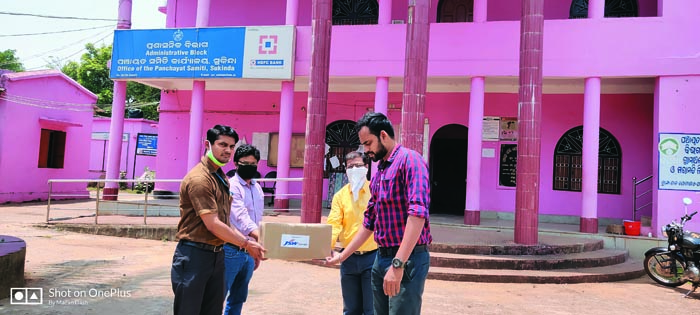
- Nandyal
- 6,800 Families received dry ration for 7 days
- 2,200 families received fresh vegetables
- 5,000 masks for the community
- 10,000 masks for community members
- 150 frontline workers received food for 30 days
- 1,400 PPE kits for health department
- Salboni
- 1,200 community members screened
- 1,000 families received dry ration for 7 days
- 5 Villages sanitation drives at regular intervals
- 1 Isolation ward with 43 beds
- Moitra
- 500 PPE kits to Health Department
- 500 Families received dry ration for 7 days
- Jajpur
- 2,840 individuals received cooked food
- 59 days of logistics support to frontline workers for better outreach
- 500 kg of Bleaching powder for sanitization of Public Places
- 100 Masks, 200 Sanitizers, 100 Soaps for community
- 150 Handgloves for the service providers
- Joda-Barbil
- 10,000 sanitary kits (sanitizer, mask, soap)
- 10,000 food packets
- 1 CHC sanitization and community messaging
- Paradip
- 10,000 sanitary kits (sanitizer, mask, soap)
- Sundergarh
- 2,500 Masks + Gloves for CHC
- 10 litre sanitizer for CHC
- 100 soaps for CHC
- 2 handheld thermometers for CHC
- 1 Isolation ward with 6 beds
- 25 N-95 Mask for CHC
- 1,250 mask for community
- 400 soaps
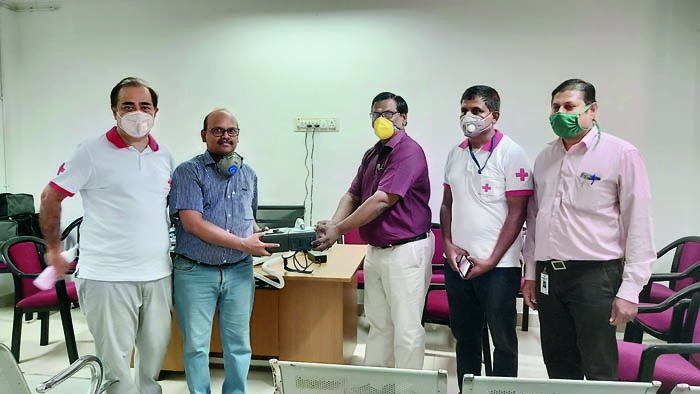
- At community level
- 400 food packets to labourers & truckers
- 5,000 litres/day of water for quarantined people
- 500 biscuit packets
- 7,418 Cotton masks
- Jaigarh
-
Following support at
the district hospital
and CHC public
health facilities:
- 10 PPE suits
- 6500 Surgical masks
- 5 Gowns
- 20 FFPs
- 4 Ventilators
- 1 Advanced thermal Imager
- 14 contactless thermometers
- 2,650 Food packets
- 3 Sanitization tunnel
-
Following support at
the district hospital
and CHC public
health facilities:
- Vasind
- Support to Health
Facility
- 200 surgical masks
- 3,000 pieces of medicine
- 35 sanitation kits
- At community
- 3,940 meals to the community
- Dolvi (includes Salav
& Dharamtar)
- 13,500 food packets for the community
- 1,24,500 masks for the community
- 2 Ventilators for Health department
- 1 Isolation ward, 50 bedded
- Kalmeshwar
- 1,300 masks for community
- 20,000 food packets
- 1,600 masks for service providers
- 100 gloves for frontline workers
- Ratnagiri
At facility level
- 200 gloves for service providers
- 5000 surgical masks for service providers
- 2000 cloth masks for service provider
- 2 Aprons
- 500 persons screened
- 30-time logistics support to the service providers
- 1 advanced thermal scanner
- Tarapur
- Support at Facility
- 1500 PPE kits
- 5 Handgloves
- 1 ventilator
- 30 Contactless digital thermometers
- Community
- 1,90,000 food meals
- Salem
- 4 Ventilators to Health department
- 4,000 families received dry ration for 7 days
- 1,000 PPE kits for M. Port Trust Hospital
- 1,000 families received food for 4 days/li>
- Barmer
- 2,000 cloth masks to the community prepared by SHGs
- 400 Families received dry Ration for 7 days
- Rs 10 Lakhs donated to CM relief funds
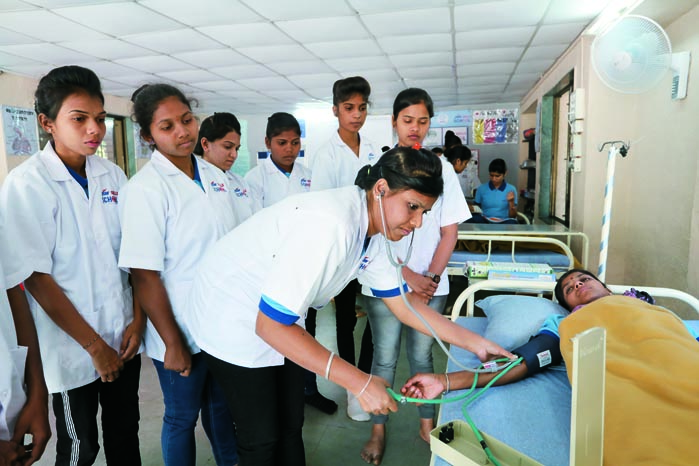
Nursing is a preferred skill and taught at the JSW Skills School in Vasind
JSW Foundation is taking up a Skill & Entrepreneurship Development
programme through its JSW Skills Schools. The Foundation has also
joined hands with the Government of India's Skill India Mission by
entering into MOU with National Skill Development Corporation
(NSDC) at national level and Maharashtra State Skill Development
Society (MSSDS) at Maharashtra state level. The mission of the JSW
Skills School is to empower the youth by providing them quality skills
and entrepreneurship skills training. The Foundation is running
eight JSW Skills Schools across India.
The JSW Skill Centre at Vasind,
Maharashtra, was established in
2003 and today offers full-time courses in industrial electrification,
automotive repair, welding, fitter fabrication and courses in beauty
and wellness as well. The centre is also partnered with Tata Motors
in the automotive sector to provide a four-wheeler Mechanic Motor
Vehicle (MMV) course at Vasind.
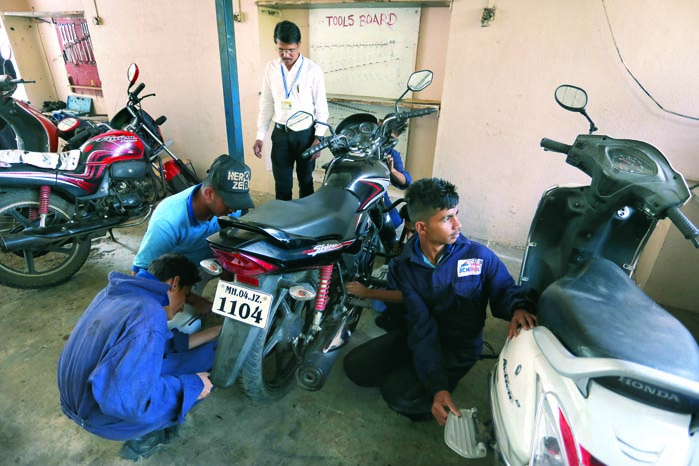
Youth are given vocational training in vehicle repair
Commenting on one of the programmes, Vidya
Gorakshkar, HeadCSR, Vasind, says, “Initially, the centre was named ‘Shram
Sadhana’
as it focussed on teaching the youth about shram, becoming selfreliant and
increasing their employability. We focus our programmes
on the recent high school or college graduates to give them skills that
could last a lifetime.” Over 2,500 students have been trained through
the JSW Skills School programme and now attracts a number of
women as well, who now have the ability to consider automotive
repair as a career option.
The courses have provided a sustainable
source of income to a
number of individuals, while a few have even chosen an entrepreneurial
route given the newly acquired skill sets. Savita Mokashi, a placement
coordinator at the JSW Skills School, shares that a majority of the
Skills School graduates are placed in respectable organisations, with
monthly income reaching as high as Rs.35,000 per individual.
The varied skill training provided builds a diverse spectrum of
professionals who further contribute to building a vibrant society.
Samir Tarmale, an instructor at the Centre, shares the following
observations, “Every student of ours, graduates with a new sense of
responsibility, confidence and professional goals.”
As the development of
social infrastructure takes precedence
through the COVID-19 crisis, JSW Skills School at Vasind now boasts
of a second batch of students trained to be paramedics and nurses.
The waste management commitment of the JSW Group starts at the
plant level – with all plant locations working towards a ‘ZERO waste
dumping’ status. Today, the Foundation is leveraging technologybased solutions
to ensure clean villages, conserving and augmenting
water, promoting biodiversity, sanitary living conditions and
sustainable livelihoods.
Other key initiatives that the JSW Group drives include conserving
mangroves along the shores of Kokan region of Maharashtra,
establishment of a ‘Nature Interpretation Centre’ at Daroji Sloth
Bear Sanctuary in partnership with the Government of Karnataka,
restoration of conventional water sources to revive natural water
bodies to facilitate effective soil and water conservation.
At Dolvi, the JSW Group's CSR team is currently working with 11 gram panchayats that oversee the functioning of 68 villages within the Raigad district. Working with the gram panchayats, they have today set-up 300 Self-Help Groups (SHG) that staff 3,000 women working on kitchen and solid waste management – this effort was taken to minimise ‘ground waste’ that was being dumped carelessly due to the absence of dumping ground.
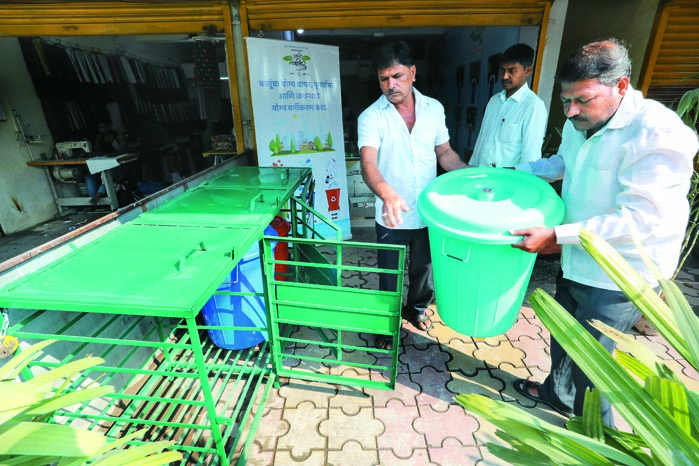
Information-cum -training waste management centre at Vasind
To ensure that waste management becomes part of an individual’s daily way of life, education and awareness of strong waste management practices are implemented from the pre-primary and primary school level “We started our waste management awareness drives first within our campus, having our students clean the school once the day is done – externally we have been conducting rallies in all neighbouring villages and I must say that the impact has been visible with cleaner environments in our villages.” says Ashok Patil, Chairman of Bal Vikas Vidya Mandir, Wadhav village, that provides education from pre-nursery to grade X. Narvel village has 70 houses that homes 315 people. Talking about the cleanliness, Sanchita Santosh Patil, member of a SHG at Narvel, shares, “JSW gave us 40 bins recently. The village is much cleaner and there are less pesky insects such as flies, mosquitoes.” The bins are complemented by two SHGs comprising 20 women, who undertake a cleanliness drive once a month.
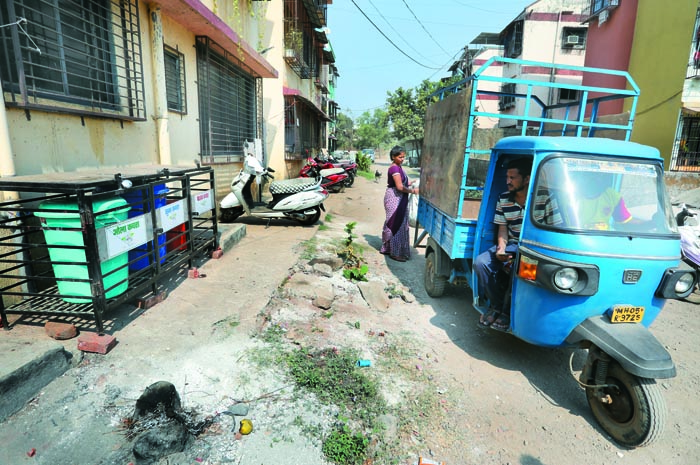
Technology-driven solutions help in waste management
At Vasind, a JSW township in Maharashtra, the Foundation has started a waste collection and information centre, a project that started in 2019. Rishi Agarwal, Founder of the NGO Mumbai Sustainability Centre, spearheads the waste management drive here that is defined by the slogan, ‘Swachh, Swasth, Sunder, Aaple Vasind’ (Our very own Clean, Healthy, Beautiful Vasind). The township also boasts of a dedicated organic waste management shed, where horticulture waste and wet waste is transformed to organic waste that is converted into manure.
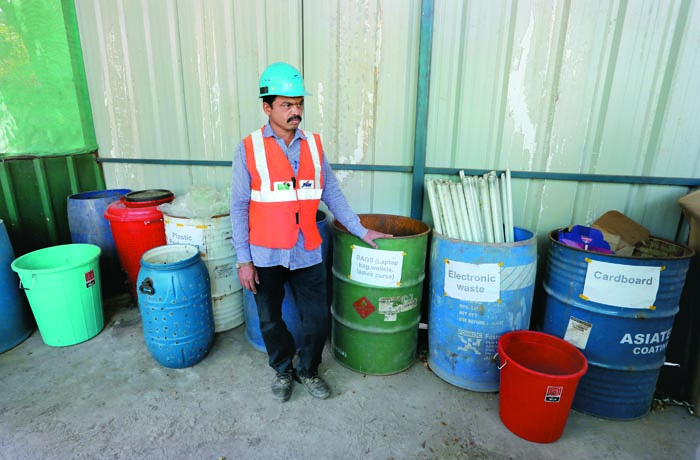
Technology-driven solutions help in waste management
JSW’s Project Shikhar, aiming to train
young girls in
professional boxing, is situated on the high altitude
terrains of Sholtu, in the apple country of Kinnaur
district in Himachal Pradesh.
In 2016, JSW Energy absorbed the Baspa
Valley project
and, during a community assessment tour on the banks
of the River Baspa, they noticed a number of young
children practicing the sport of boxing, using a hanging
tyre.
Wanting to encourage and nurture this talent that they
had spotted, the JSW Energy team partnered with
Opinder Negi, a national level boxer from the region, to
train and promote talent from the state for representation
in national and international championships. Trainees
in the programme are provided with requisite equipment
such as boxing gloves, punching pads and head guards, and a nutritious and
balanced diet that includes essentials
like eggs, fruit, milk, sprouts, soybean, oatmeal, etc.
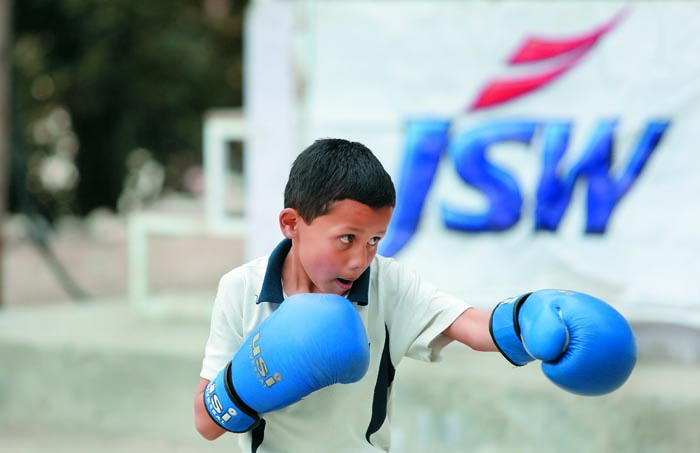
Under Project Shikhar, the local youth are trained in professional boxing
Today, almost 50 children, the majority
being girls, are
part of regular boxing training in this facility at Sangla
village on the banks of the Baspa river. In a short span of two
years, three international, five national and 57 state-level
championship medals have been won from this training
institute. Vinakshi, one of the trainees from the Sangla
training facility, won gold in an international tournament
in Bhutan. Sneha and Deepika Kumari from the same
facility have won medals in international championships in
Spain and Sweden respectively.
On winning the gold medal at the 2020
International
Golden Girl Championship in Sweden, Deepika says, “With
proper training and dedication, Indian athletes can amaze
everyone with their performance. I am lucky to have been
trained through Shikhar. I now see that the girls in the
villages are interested in taking up sports as a career.”
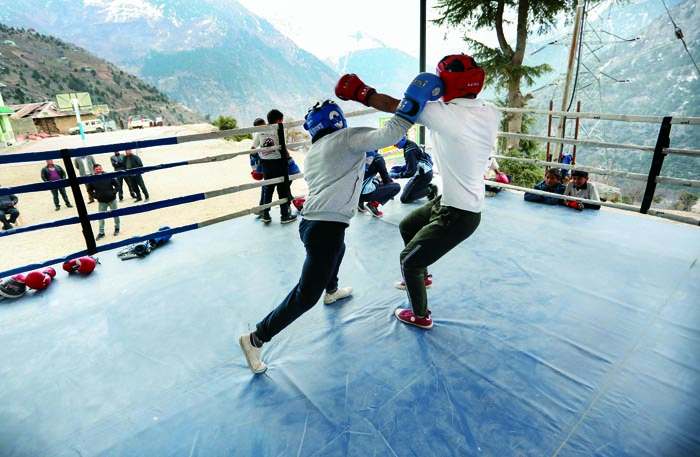
Under Project Shikhar, the local youth are trained in professional boxing
Along with the main facility, four
full-fledged rings and
coaching facilities have sprung up in the project influence
area in Kinnaur district. There are now seven places offering
coaching and boxing training on a daily basis with around
200 youngsters enrolled. With complete support including
scholarships, diet, training, education, and event
participation fees, the youngsters in Kinnaur region are
channeling their boxing talent to bring in achievements for
the country.
Encouraged by the response from the young trainees, the
JSW Group also built an international standard boxing ring
at Urni village school campus and held a three-day statelevel under-19
Boxing Championship in 2019 which saw the
participation of 160 boys and girls. Eight-year-olds Krish
and Nakul, who won top accolades at the competition, are
now social media celebrities in Himachal Pradesh.
Given the success of Shikhar, the Group is now building a High Altitude Boxing Academy (HABA) in Sangla Valley for training athletes, which would be a unique initiative in the country that trains athletes in snowy conditions.
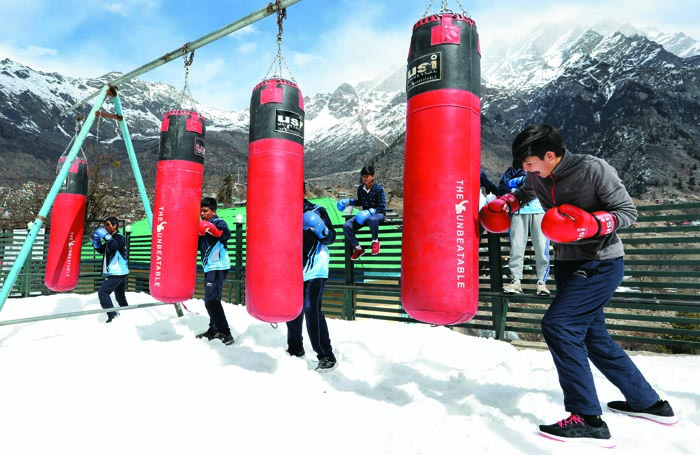
young ones are now inspired to get fitter and better in boxing
In Kinnaur district itself, JSW Foundation also runs Project Charkha. Imparting handloom weaving skills to women to keep the age-old designs and the craft alive, the company has set-up 11 Charkha centres in the Baspa-Satluj river zone. Initially, 40 women came together to form a Self-Help Group (SHG) in Brua and Shong villages of Sangla Valley Now with the growing number of participants, the Foundation has institutionalised a one-year training programme. “I enrolled in the Charkha programme because I see a huge demand for traditional handlooms in this area. If I become well trained in this, I am sure I can earn enough for my family. I have been told that after a year long training I will be given a weaving machine and I can sell my products on my own. If I can make a surplus, I will be also assisted to market the products,” says Anoop Kumari, a trainee at the Sangla Charkha centre.
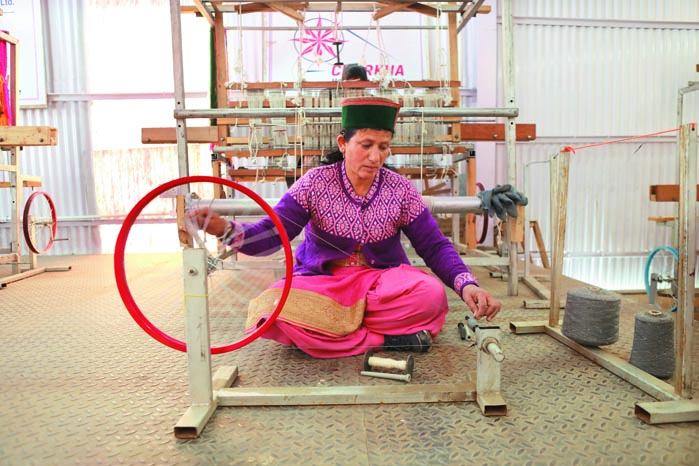
Charkha products are listed on Amazon and e-commerce platforms, and a Handloom Shoppe on NH5 is also on the anvil
Charkha products are now listed on Amazon
and other e-commerce
platforms and the Foundation is now setting up a Handloom Shoppe
on NH5 with free coffee and other amenities for visitors, to promote
the Kinnaur handloom products. The products were also on sale at
the summer festivals in the state.
“All our medical needs are taken care
of because of this Charkha
centre. I feel proud that through this programme I am preserving
the traditional art of my ancestors,” says Dev Kumari, a trainee at
the Sholtu Charkha centre.
The seeds of change were sown a long time
back by the JSW Group,
and the organisation is proud to continuously nurture development
at all levels.

Sangita Jindal
Chairperson, JSW Foundation
How has the JSW Foundation evolved since its inception two decades ago?
The Foundation was initiated in 1989 on the idea that every life is important and every being must be provided with fair opportunity.When we began our journey, we worked on charity-driven welfare projects with a strong focus to create a positive impact for our employees,
their families and communities around our plant lcoations, such as Vasind (Maharashtra) and Vijayanagar (Karnataka). At the core of these welfare projects was education, basic skill training in tailoring and awareness programes on basic health and hygiene. As our footprint grew in parallel to the growth of JSW Group, we further moved on to communitycentric long-term development programmes. Thirty years later, today we positively impact one million lives across nine states in India with our focus now having expanded to the areas of malnutrition, child mortality, elevating learning to make it effective and meaningful, empowering of youth through employable skill programmes, ensuring water security access to sanitation facilities in rural India, preservation and conservation of national heritage and promotion of sports.
Do you see a change of priority areas for the JSW Foundation post COVID -19?
We are still in the midst of our initiatives towards assisting the country through this crisis and are aware that we have a long road ahead of us. When we do close these initiatives, we will consolidate our learnings from this pandemic and continue to support the evolving needs of the community in a post COVID-19 world.
How important is the role of CSR funding in building a strong social infrastructure in this country?
I always believe that Corporate Social Responsibility is conscience-driven and goes beyond considered ‘societal obligations’ of any organisation. Having been personally active in the development space for close to two decades now, I have seen how critical the role funding through CSR plays in the engine of social development. While the government mandated a percentage of revenues to be budgeted towards CSR, it allowed the contributing organisation to pick the areas in which the spend should be made. And that I believe has given organisations a strong sense of ownership towards the projects they fund, thereby making their involvement more sustainable in the long-term. Unfortunately, a crisis such as COVID-19 has also highlighted the gaps in our social infrastructure and I envision a lot more projects will emerge that will plug these gaps, which I do hope will get appropriate funding from the community.




